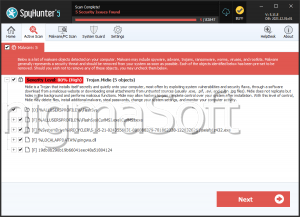Your Netflix Membership Has Expired Email Scam
Analysis of the emails claiming that 'Your Netflix Membership Has Expired' reveals that these messages are skillfully constructed by fraudsters with the intention of deceiving recipients into revealing sensitive personal information. Categorized as phishing attempts, these fraudulent emails pose a significant threat, emphasizing the critical need for recipients to exercise utmost caution and avoid any form of interaction with such deceptive communication. It is paramount for individuals to be vigilant and refrain from providing any personal information in response to these misleading messages to safeguard themselves against potential identity theft or financial harm.
The 'Your Netflix Membership Has Expired' Phishing Tactic could Compromise Sensitive User Information
This phishing email employs a deceptive approach, masquerading as a communication from Netflix and falsely asserting that the recipient's membership has expired. The email employs a tactic of enticing the recipient with a purported 90-day extension, framed as part of an enticing loyalty program.
To initiate this extension, the deceptive email directs the receivers to click on a provided link, where they are invited to enter their credit card details under the guise of validating their Netflix ID. Despite the email's assurance that no funds will be withdrawn, it is crucial to recognize that this is a classic phishing attempt.
Upon investigation, the website accessed by clicking the 'Extend for Free' button, as promoted in the phishing email, was found to be inaccessible. However, there remains a considerable risk that the scammers orchestrating this email scheme aim to extract personal data, such as credit card details and login credentials and from unsuspecting recipients.
Acquiring login credentials opens the door for scammers to access the victim's accounts, compromising a wealth of personal and sensitive data stored within those accounts. This may encompass personal information, emails, financial records, and more. The fraudsters frequently leverage this data for unauthorized transactions, fraud, or even to assume the victim's identity for further illicit activities.
Possessing collected credit card details empowers fraudsters to engage in fraudulent transactions, make unauthorized purchases or trade compromised information on the dark Web. This can end up in substantial financial losses for the cardholder as the stolen credit card data is exploited for online transactions without authorization. Vigilance and awareness are paramount to thwarting such phishing attempts and safeguarding personal and financial information.
Recognize the Typical Signs of a Fraudulent or Phishing Email
Recognizing the signs of a fraud-related or phishing email is crucial for users to protect themselves from potential fraud and security breaches. Here are typical indicators that users should be aware of:
- Generic Greetings:
- Phishing emails commonly use generic greetings like 'Dear Customer' instead of addressing you by name. Legitimate organizations usually personalize their communications.
- Urgency or Threats:
- Fraud-related emails often create a sense of urgency or threaten dire consequences if immediate action is not taken. Be cautious if an email pressures you to act quickly without allowing time for verification.
- Unexpected Attachments or Links:
- Avoid accessing attachments or clicking on links in unexpected emails. The fraudsters often use these to deliver malware or direct users to fake websites designed to steal information.
- Misspelled Words and Grammar Issues:
- Phishing emails frequently contain spelling mistakes, grammatical errors, or awkward language. Legitimate communications from reputable organizations typically undergo thorough proofreading.
- Requests for Personal Information:
- Be suspicious of emails requesting sensitive personal details, such as passwords, credit card information or Social Security numbers. Legitimate entities typically do not ask for this information via email.
- Unusual Sender Requests:
- Watch out for unusual requests, especially those related to sending money, gift cards, or making financial transactions. Legitimate organizations usually have secure and standard channels for such transactions.
- Unsolicited Prize or Reward Notifications:
- Be cautious if an email claims you've won a prize or reward without any prior participation. Scammers use such promises to entice users into providing personal information.
Being vigilant and recognizing these signs can help users identify and avoid falling victim to scams and phishing attempts, ensuring a safer online experience.


